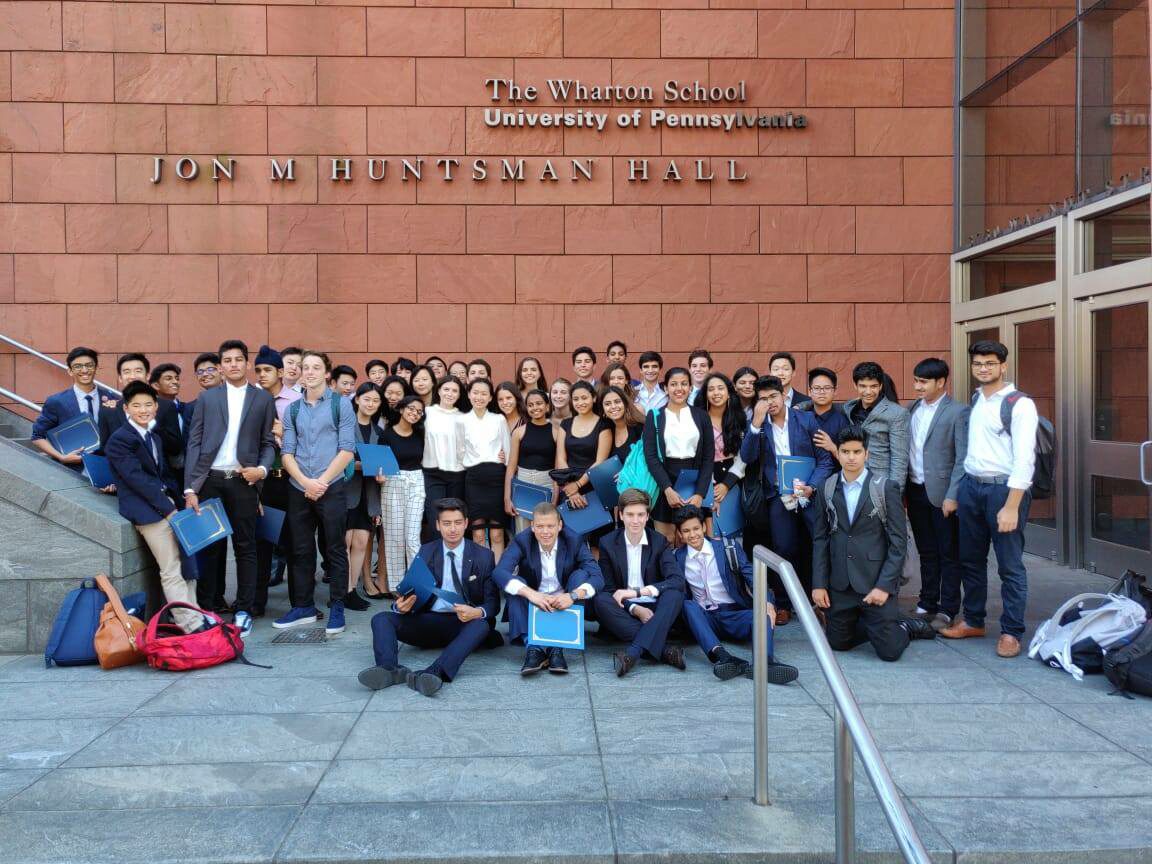A Comprehensive Guide To MBA By The Wharton School
The Wharton School, established in 1881 as part of the University of Pennsylvania, has cemented its place as a leading institution in global business education. Renowned for its rigorous academic programs, pioneering research, and extensive alumni network, Wharton stands out for its innovative approach to business education. The University of Pennsylvania is known as the “birthplace of contemporary business education.” Wharton is the first collegiate business school in the United States and an M7 group of top MBA programs.
The Wharton School is Penn’s most prestigious program, with a reputation for being at the cutting edge of research and business. It is often regarded as the best of the six Ivy League graduate business schools. Expectations are high at Wharton because of the school’s illustrious history and reputation. The MBA program, in particular, is celebrated for its blend of theory and practical application, preparing students to become leaders in various business sectors.

This guide delves into the MBA offered by Wharton, providing prospective students with a comprehensive understanding of what makes this program unique and highly sought after. Read through!
Program Structure
The Wharton MBA is typically a two-year program, designed to provide a deep dive into fundamental business concepts while allowing students to tailor their education to their specific interests and career goals. The first year is predominantly focused on core courses, covering essential subjects such as finance, marketing, statistics, and ethics. These foundational courses are pivotal in building a solid base in business management principles.
In the second year, students have the liberty to choose from a wide range of electives, enabling them to specialize in areas of their interest. Wharton’s MBA program is renowned for its extensive elective courses, offering more than 200 options. This flexibility allows students to either deepen their expertise in a specific field or explore a diverse set of subjects to broaden their business acumen.
Moreover, the program emphasizes experiential learning, offering hands-on projects, internships, and global immersion programs. These opportunities enable students to apply classroom knowledge in real-world settings, fostering practical skills crucial for their future careers.
Admission Process
Admission to Wharton’s MBA program is highly competitive, with a holistic approach to evaluating candidates. Requirements include a strong academic record, competitive GMAT or GRE scores, and substantial work experience. Wharton looks for candidates with a track record of leadership, innovation, and a clear vision for their future. The application process involves submitting essays that reflect the applicant’s career aspirations, personal growth, and how an MBA from Wharton aligns with their goals. Recommendations and interviews are also integral components, providing insights into the applicant’s character, professional achievements, and potential for success in the program.
Specializations and Areas of Study
Wharton offers various specializations, allowing students to focus on areas like Finance, Marketing, Operations, Management, and more. Each specialization comprises a set of courses designed to provide in-depth knowledge and practical skills. Students can also pursue unique majors or interdisciplinary programs, combining different areas of study to create a customized educational experience.
Values they look for
Wharton attracts thousands of applicants each year as a top-tier MBA program. Wharton looks for three primary attributes when considering prospects for admission, according to people’s experiences: influential leadership, excellent analytical skills, and the capacity to collaborate.
- Wharton will draw on your examples of effective leadership from projects and initiatives you have led both at work and in your recreational activities.
- Wharton evaluates a candidate’s analytical and quantitative skills in various methods, including undergraduate GPA, GMAT/GRE score, and commercial work experience, equivalent to other top-tier MBA programs.
- Wharton not only wants to see how you’ve collaborated with people in the past, but they also want to see how you collaborate in a real-world, team-based context during the group interview.
Curriculum
The Wharton MBA curriculum, which was redesigned in 2012, features a distinctive framework that balances rigour and flexibility. The intense, cross-functional core curriculum teaches business principles and crucial leadership, communication, and analytical skills. By choosing a major and complementing electives, you can specialize in one or more disciplines. To achieve your goals, you can choose from 18 MBA majors. Most majors have five CUs, with four of them being required in addition to the core curriculum. Courses may be applied to more than one major, allowing you to pursue an MBA with a double major. To round out the curriculum, you can take electives in different MBA specialties to further customise your study. Here is the list of all MBA majors offered by Wharton.
Although each instructor and class setting affects the MBA curriculum, the essential course offerings remain identical throughout the program. The core curriculum consists of six obligatory core subjects and a flexible core with options. For example, students might take more electives in the first year to prepare for an internship and delay other electives until the second year because of the flexibility.
Following are all part of the fixed core:
- Leadership
- Marketing
- Microeconomics
- Economics
- Statistics
- Management
Marketing, macroeconomics, communications, accounting, corporate finance, operations, legal studies, and business ethics are among the most adaptable fundamental topics.
The MBA Core classes are split into two halves, each with 9.5 credit units:
- Fixed Core: In the first semester, 3.25 credit units are fixed.
- Flexible Core: 6.25 credit units can be taken in the first semester or at any time after that.
A sequential division of the syllabus would include
- A pre-term, when the student clears the application process and takes up a core governance and team working course.
- The first year, when the student commences critical courses and joins five or six other learners in team projects, chooses university courses, and engages in extracurricular activities;
- The offseason, when a student begins internships (optional) and joins summative projects.
Career Opportunities and Networking
The career opportunities post-graduation are vast, with Wharton’s MBA opening doors in numerous industries globally. The school’s dedicated career services offer counseling, networking events, and recruitment opportunities. The alumni network is a powerful resource, fostering connections that span across industries and countries. This network serves as a lifelong asset, providing support, opportunities, and a sense of community to Wharton graduates.
Student Life and Culture
Life as a Wharton MBA student extends beyond academics. The campus is bustling with clubs, organizations, and events that cater to a wide range of interests and passions. The student body is diverse, bringing together perspectives from all over the world, and fostering an inclusive environment. This vibrant community is a cornerstone of the Wharton experience, contributing significantly to personal growth and learning. Student groups influence the Wharton MBA experience in a variety of ways. They cater to a variety of interests, including social, cultural, athletic, and professional. The Wharton Graduate Association (WGA) is The Wharton School’s graduate student governing group. The Wharton Graduate Association (WGA) is a non-profit organization that oversees all MBA student organizations and conferences at The Wharton School. The WGA provides a plethora of possibilities for students to form friendships and pursue their passions. Student clubs at Wharton are a great opportunity to develop soft skills, create networks, learn management and leadership, encourage teamwork, corporate insights and many more. Here is the list for the amazing student clubs of Wharton.
Experiential Learning
Wharton’s unique blend of leadership curriculum, mentoring, experiential learning, and a broad range of student-run activities will help you grow as a leader. Wharton’s MBA leadership experience is centred on the Learning Team concept, which was created by Wharton and is now used by other schools. The Learning Team approach is inspired by the business sector, where employees collaborate in teams and rely on persuasive leadership rather than positional leadership. In Pre-Term, teams of five or six people that you’ll get to know well, form and continue to work in Management. Each group includes a position of varied vacations, hobbies, and international backgrounds because the team is not self-selected. A great and diverse group of peers encourages trial and error, taking risks, and collaborating on ideas, and will radically change the world for the students. Here’s a list of the Experiential learning projects at Wharton.
Financial Aspects
The financial commitment for pursuing an MBA at Wharton is substantial, with tuition fees and living expenses being significant considerations. However, the school offers various financial aid options, including scholarships and loans, to assist students in funding their education. These financial support systems are crucial in ensuring that the program is accessible to a diverse range of students.
You can grasp the fee details here.
Global Exposure and International Opportunities
Wharton’s global perspective is a defining feature of its MBA program. Students have opportunities to engage in international study programs, exchange partnerships, and global immersion experiences. These initiatives are designed to broaden students’ understanding of global business dynamics and prepare them for leadership roles in an increasingly interconnected world.
The Wharton School’s MBA program not only imparts essential business skills but also fosters a broader understanding of the role of business in society. Graduates of Wharton’s MBA program are well-equipped to make significant contributions in their chosen fields, driven by knowledge, innovation, and a commitment to ethical leadership.
MentorMpact – Your Trusted Partner in MBA Admissions

MentorMpact is an end-to-end college admissions consulting and counselling firm. At MentorMpact, we work with the students and for the students. We value the trust you put in us and we creatively partner with you to accomplish your dream school admission. Our endeavor is to provide the best for our clients.
- Personalized Application Strategy: Our experienced consultants will work closely with you to create a tailored application strategy that highlights your strengths and addresses your weaknesses head-on.
- Strengthening Your Weaknesses: We’ll provide you with targeted guidance and preparation to transform your weaknesses into strengths, ensuring a compelling application.
- Comprehensive Essay Assistance: Crafting a powerful essay is vital. Our skilled consultants will help you articulate your journey, experiences, and aspirations effectively.
- Optimal Recommender Selection: The right letters of recommendation can make a significant difference. We’ll assist you in choosing recommenders who can eloquently highlight your strengths and improvements.
- Interview Preparation: A successful interview is the final step. We’ll equip you with the skills and confidence needed to ace your interviews, even addressing questions about your weaknesses.
Contact us to know more!

